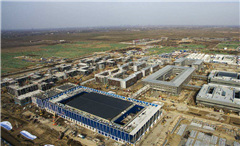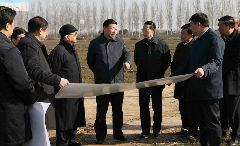Xiongan pillars: infrastructure, high-tech
2018-04-23
China Daily
High-quality development founded on innovation and high-tech industries is the focal point of a newly released plan for the Xiongan New Area, which analysts say will boost investment and accelerate construction of transport infrastructure connecting the Beijing-Tianjin-Hebei cluster.
The full-context plan, released on April 22, set 38 key targets to build Xiongan into an innovation-driven, smart, ecologically friendly and easy-to-live-in area.
The key targets include the ratio of research and development expenditure in the local GDP, the number of patents registered by every 10,000 people, big data’s contribution to urban and emergency management and air quality improvement. For residents, the most eye-catching part of the plan could be that everything is accessible within a 15-minute drive or walk.
Last April, China announced the establishment of the Xiongan New Area-which has “lasting importance for the millennium to come”-spanning three counties in Hebei province, southwest of downtown Beijing. The move is to transfer noncapital functions from Beijing and boost integration of Beijing-Tianjin-Hebei cluster.
Construction of Xiongan-another new area of “national significance” following the Shenzhen Special Economic Zone and Shanghai Pudong New Area-is expected to be accelerated this year after the design and planning is completed, said Zhang Zhongjie, an analyst at Huajin Securities. Bidding and construction on transport projects, including railways and highways, will probably start soon.
Xiongan won’t be made into a megacity and will manage urban construction in an orderly way, Yang Baojun, president of the China Academy of Urban Planning and Design, told Xinhua News Agency. It will be built as a pleasant city with a balance between people’s work and living, he said.
The new plan will spur huge amounts of investment, up to at least 10 trillion yuan ($1.58 trillion), said Liu Guoqing, chief analyst of machinery industries at Pacific Securities. Investments into Xiongan should be at least comparable to the Binhai New Area in Tianjin, which was established in 2009 and has seen about 1 trillion yuan of investment in each of the past nine years, he said.
This year, 13 projects will be started in Xiongan, with investment of more than 60 billion yuan, the Shanghai-based website thepaper.cn reported. One of them is the high-end lab for national defense technologies of Tsinghua University.
In its first phase, innovation-based projects such as big data, artificial intelligence and biotechnology will be transferred from Beijing to Xiongan, according to the plan. So far, the new area has more than 100 high-tech companies, attracting other innovation-driven entities.
Peng Weijun, an analyst at Essence Securities, said the targets set for Xiongan are all very high and unimaginable support will be given to carry out the plan. There is great potential to develop such industries as environmental protection, smart city and the financial sector, he said.
Over the weekend, Beijing and Hebei pledged their full support to building the new area.


